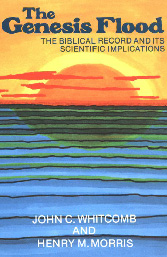Related Research Articles

Creationism is the religious belief that nature, and aspects such as the universe, Earth, life, and humans, originated with supernatural acts of divine creation. In its broadest sense, creationism includes a continuum of religious views, which vary in their acceptance or rejection of scientific explanations such as evolution that describe the origin and development of natural phenomena.

Creation science or scientific creationism is a pseudoscientific form of Young Earth creationism which claims to offer scientific arguments for certain literalist and inerrantist interpretations of the Bible. It is often presented without overt faith-based language, but instead relies on reinterpreting scientific results to argue that various myths in the Book of Genesis and other select biblical passages are scientifically valid. The most commonly advanced ideas of creation science include special creation based on the Genesis creation narrative and flood geology based on the Genesis flood narrative. Creationists also claim they can disprove or reexplain a variety of scientific facts, theories and paradigms of geology, cosmology, biological evolution, archaeology, history, and linguistics using creation science. Creation science was foundational to intelligent design.

Kenneth Alfred Ham is an Australian Christian fundamentalist, young Earth creationist, apologist and former science teacher, living in the United States. He is the founder, CEO, and former president of Answers in Genesis (AiG), a Christian apologetics organisation that operates the Creation Museum and the Ark Encounter.

Young Earth creationism (YEC) is a form of creationism which holds as a central tenet that the Earth and its lifeforms were created by supernatural acts of the Abrahamic God between about 6,000 and 10,000 years ago. In its most widespread version, YEC is based on the religious belief in the inerrancy of certain literal interpretations of the Book of Genesis. Its primary adherents are Christians and Jews who believe that God created the Earth in six literal days. This is in contrast with old Earth creationism (OEC), which holds literal interpretations of Genesis that are compatible with the scientifically determined ages of the Earth and universe. It is also in contrast to theistic evolution, which posits that the scientific principles of evolution, the Big Bang, abiogenesis, solar nebular theory, age of the universe, and age of Earth are compatible with a metaphorical interpretation of the Genesis creation account.

Old Earth creationism (OEC) is an umbrella of theological views encompassing certain varieties of creationism which may or can include day-age creationism, gap creationism, progressive creationism, and sometimes theistic evolutionism.

Theistic evolution is a view that God acts and creates through laws of nature. It posits that the concept of God is compatible with the findings of modern science, including evolution. Theistic evolution is not in itself a scientific theory, but includes a range of views about how science relates to religious beliefs and the extent to which God intervenes. It rejects the strict creationist doctrines of special creation, but can include beliefs such as creation of the human soul. Modern theistic evolution accepts the general scientific consensus on the age of the Earth, the age of the universe, the Big Bang, the origin of the Solar System, the origin of life, and evolution.

Evolutionary creation, also presented as Evolutionary creationism, is the religious belief that God created the earth using processes of evolution. The concept is similar to theistic evolution and accepts modern science, but there are theological differences.

Day-age creationism, a type of old Earth creationism, is an interpretation of the creation accounts in Genesis. It holds that the six days referred to in the Genesis account of creation are not literal 24-hour days, but are much longer periods. The Genesis account is then reconciled with the age of the Earth. Proponents of the day-age theory can be found among both theistic evolutionists, who accept the scientific consensus on evolution, and progressive creationists, who reject it. The theories are said to be built on the understanding that the Hebrew word yom is also used to refer to a time period, with a beginning and an end and not necessarily that of a 24-hour day.

Flood geology is a pseudoscientific attempt to interpret and reconcile geological features of the Earth in accordance with a literal belief in the Genesis flood narrative, the flood myth in the Hebrew Bible. In the early 19th century, diluvial geologists hypothesized that specific surface features provided evidence of a worldwide flood which had followed earlier geological eras; after further investigation they agreed that these features resulted from local floods or from glaciers. In the 20th century, young-Earth creationists revived flood geology as an overarching concept in their opposition to evolution, assuming a recent six-day Creation and cataclysmic geological changes during the biblical flood, and incorporating creationist explanations of the sequences of rock strata.

Answers in Genesis (AiG) is an American fundamentalist Christian apologetics parachurch organization. It advocates Young Earth creationism on the basis of its literal, historical-grammatical interpretation of the Book of Genesis and the Bible as a whole. Out of belief in biblical inerrancy, it rejects the results of scientific investigations that contradict their view of the Genesis creation narrative and instead supports pseudoscientific creation science. The organization sees evolution as incompatible with the Bible and believes anything other than the young Earth view is a compromise on the principle of biblical inerrancy.

Gap creationism is a form of old Earth creationism that posits that the six-yom creation period, as described in the Book of Genesis, involved six literal 24-hour days, but that there was a gap of time between two distinct creations in the first and the second verses of Genesis, which the theory states explains many scientific observations, including the age of the Earth. It differs from day-age creationism, which posits that the 'days' of creation were much longer periods, and from young Earth creationism, which although it agrees concerning the six literal 24-hour days of creation, does not posit any gap of time.

Progressive creationism is the religious belief that God created new forms of life gradually over a period of hundreds of millions of years. As a form of old Earth creationism, it accepts mainstream geological and cosmological estimates for the age of the Earth, some tenets of biology such as microevolution as well as archaeology to make its case. In this view creation occurred in rapid bursts in which all "kinds" of plants and animals appear in stages lasting millions of years. The bursts are followed by periods of stasis or equilibrium to accommodate new arrivals. These bursts represent instances of God creating new types of organisms by divine intervention. As viewed from the archaeological record, progressive creationism holds that "species do not gradually appear by the steady transformation of its ancestors; [but] appear all at once and "fully formed."

Recurring cultural, political, and theological rejection of evolution by religious groups exists regarding the origins of the Earth, of humanity, and of other life. In accordance with creationism, species were once widely believed to be fixed products of divine creation, but since the mid-19th century, evolution by natural selection has been established by the scientific community as an empirical scientific fact.

The history of creationism relates to the history of thought based on the premise that the natural universe had a beginning, and came into being supernaturally. The term creationism in its broad sense covers a wide range of views and interpretations, and was not in common use before the late 19th century. Throughout recorded history, many people have viewed the universe as a created entity. Many ancient historical accounts from around the world refer to or imply a creation of the earth and universe. Although specific historical understandings of creationism have used varying degrees of empirical, spiritual and/or philosophical investigations, they are all based on the view that the universe was created. The Genesis creation narrative has provided a basic framework for Jewish and Christian epistemological understandings of how the universe came into being – through the divine intervention of the god, Yahweh. Historically, literal interpretations of this narrative were more dominant than allegorical ones.

The Genesis Flood: The Biblical Record and its Scientific Implications is a 1961 book by young Earth creationists John C. Whitcomb and Henry M. Morris that, according to Ronald Numbers, elevated young Earth creationism "to a position of fundamentalist orthodoxy."

Henry Madison Morris was an American young Earth creationist, Christian apologist and engineer. He was one of the founders of the Creation Research Society and the Institute for Creation Research. He is considered by many to be "the father of modern creation science". He coauthored The Genesis Flood with John C. Whitcomb in 1961.
A.J. Monty White is a British young Earth creationist and was formerly the Chief Executive of the UK branch of Answers in Genesis. White is a graduate of the University of Wales; he obtained a BSc in Chemistry in 1967 and in 1970 earned his PhD for research in the kinetic theory of gas from Aberystwyth University.
John Clement Whitcomb Jr. was an American theologian and young Earth creationist. Along with Henry M. Morris, he wrote The Genesis Flood, which influenced many conservative American Christians to adopt flood geology.

Rejection of evolution by religious groups, sometimes called creation–evolution controversy, has a long history. In response to theories developed by scientists, some religious individuals and organizations question the legitimacy of scientific ideas that contradicted the young earth pseudoscientific interpretation of the creation account in Genesis.
Although biological evolution has been vocally opposed by some religious groups, many other groups accept the scientific position, sometimes with additions to allow for theological considerations. The positions of such groups are described by terms including "theistic evolution", "theistic evolutionism" or "evolutionary creation". Of all the religious groups included on the chart, Buddhists are the most accepting of evolution. Theistic evolutionists believe that there is a God, that God is the creator of the material universe and all life within, and that biological evolution is a natural process within that creation. Evolution, according to this view, is simply a tool that God employed to develop human life. According to the American Scientific Affiliation, a Christian organization of scientists:
A theory of theistic evolution (TE) — also called evolutionary creation — proposes that God's method of creation was to cleverly design a universe in which everything would naturally evolve. Usually the "evolution" in "theistic evolution" means Total Evolution — astronomical evolution and geological evolution plus chemical evolution and biological evolution — but it can refer only to biological evolution.
References
- Numbers, Ronald (30 November 2006). The Creationists: From Scientific Creationism to Intelligent Design, Expanded Edition. Harvard University Press. pp. 624 pages. ISBN 0-674-02339-0.